Homeland Movement Supports Appeal by Voice of Entrepreneurs
ZAGREB, 9 January, 2021 - Homeland Movement leader Miroslav Skoro on Saturday supported the Voice of Entrepreneurs association in criticising the extension of coronavirus restrictions which were affecting businesses, notably bars and restaurants.
"We are talking a billion kuna in revenues which could have been generated in the last month alone. Advent is the time when people spend more. It was an irrational decision because people working in this sector are now out in the field cooking and handing out thousands of meals to earthquake victims and they are in direct contact. On the other hand, the government, who imposed these rigorous epidemiological measures on movement, lifted these measures at the time of this disaster," Skoro told the press during a visit to the earthquake-hit Banovina region.
It is normal that bar and restaurant owners are angry over "double standards" used by the government and the national coronavirus response team, he said.
The Voice of Entrepreneurs appealed to the government on Friday to say what businesses could expect after January 8 when the coronavirus restrictions imposed for the Christmas and New Year holidays expired. The restrictions have in the meantime been extended until the end of the month.
Before his tour of Banovina, Skoro had visited a warehouse in Kutina where Homeland Movement volunteers were distributing parcels with food, clothing and other necessities for earthquake victims.
He said that the Homeland Movement had distributed about 1,200 tonnes of food and hygiene products. He added that aid was still coming in and that some donors wanted to distribute aid only through the Homeland Movement, citing an aid delivery worth one million euro that recently arrived from Austria.
Skoro also said that his party would support an initiative to set up a commission of inquiry into post-war reconstruction, after it emerged that many of the houses repaired after the 1991-1995 Homeland War had collapsed in the 29 December earthquake that struck the Banovina region. He, however, recalled that previous such commissions had worked along the lines "if you don't want to establish facts, set up a commission."
Vuk Vukovic's Analysis Reveals Worrisome Data on Vulnerable Croatian Companies
As Marko Repecki/Telegram writes on the 14th of December, 2020, if almost 7,000 vulnerable companies fail (according to the data from August, they're now even more endangered than they were before with this new lockdown), the Croatian state budget will lack a massive 3 billion kuna, which is equivalent to funds for as many as 130,000 pensions, according to the Voice of Entrepreneurs Association (Glas Poduzetnika). Economist and head of the Economic Council of the Voice of Entrepreneurs, Vuk Vukovic, analysed the effect of the collapse of vulnerable companies on the state budget.
The aforementioned association has been warning that micro, small and medium-sized enterprises will unfortunately be the ones to bear the brunt of the ongoing coronavirus crisis and that many of them will have to close their doors due to the lack of concrete assistance.
About 500,000 workers were affected by the measures
Vuk Vukovic's analysis is based on data on aid for job preservation from the Croatian Employment Service (CES), which is presented by month, and on data on the financial statements of all Croatian companies from back in pre-pandemic 2019.
Table 1 and Graph 1 indicate several interesting trends. First, during the lockdown (from March to the end of May), between 415 and 500 thousand workers were affected by the then introduced measures. This regards employees who, at least at that time, depended on state aid of 4,000 kuna because they weren't able to work (their companies were closed or they were in isolation).
In 2019, they generated 419 billion kuna in revenue
A total of 55 thousand companies were, at one time, dependent on this type of assistance. It's worth pointing out that these companies generated a total of 419 billion kuna in revenue in 2019, which is more than the Croatian GDP from that year (which amounted to about 400 billion kuna) and represents 52 percent of the total revenue earned by all Croatian companies in 2019. Half of the Croatian economy was directly affected by the crisis caused by the COVID-19 pandemic.
"This doesn't mean that 419 billion kuna in revenue was endangered because not all revenues fell by more than 50 percent, some actually fell by much less, but in those months, many companies asked for support,'' explained Vuk Vukovic.
After the lockdown, there was a drop in the number of people provided with the aforementioned grants
Interestingly, after the lockdown, there was a sharp drop in the number of people using those government subsidies, from 415 thousand down to a significantly lower 72 thousand in June, and from 54 thousand companies to 6800 who were still seeking such support for their 49 thousand workers during the month of August. These companies, which were obviously still sailing through troubled waters three months after the lockdown and as such needed to seek 4,000 kuna in aid for their workers, account for a total of almost 37 billion kuna in revenue (9 percent of GDP).
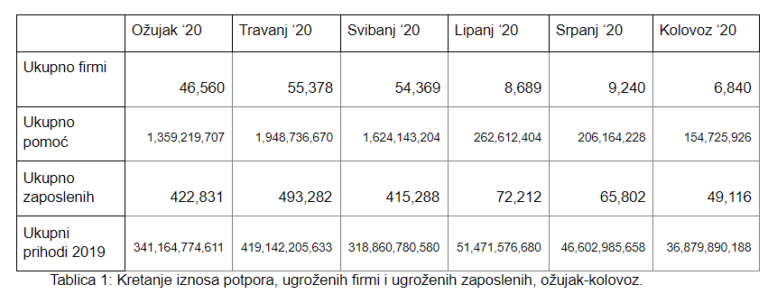
In other words, the collapse of these companies, which haven't yet recovered from the shock of this continuing crisis, directly threatens 49 thousand jobs and 9 perent of GDP (this data refers to the period before the new, partial lockdown came into force).
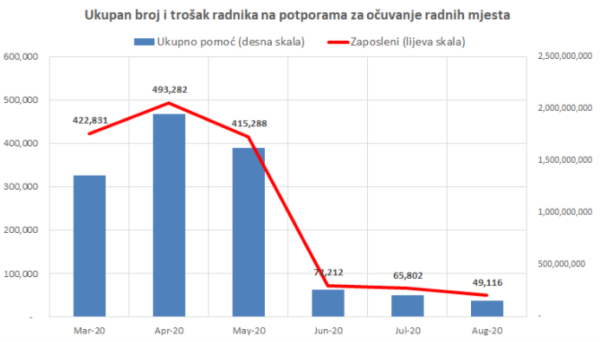
The next category is the data on paid taxes and contributions of micro, small and medium enterprises registered in Croatia. Table and Graph 2 show the distribution of income tax payments and taxes and contributions from salaries and employee salaries for all companies in Croatia for the year 2019.
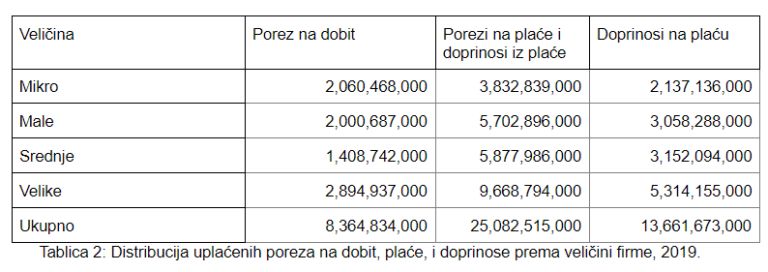
They paid 29.2 billion kuna in taxes and contributions last year
Back in 2019, micro, small and medium-sized (SME) companies in Croatia paid a total of 5.5 billion kuna through profit tax and 23.7 billion kuna through taxes on salaries and contributions. This total amount, excluding VAT, of as much as 29.2 billion kuna, was enough to cover the total costs of the healthcare system in 2019, which stood at around 12.8 billion kuna, the police, court and prison costs (8.8 billion kuna), military expenditures (4.7 billion kuna) and even expenditures on sports, religion and culture (an additional 2.6 billion kuna).
Or, a different calculation of 29.2 billion kuna collected only from micro, small and medium enterprises would show that it was enough to finance the total cost of pensions of 27.4 billion kuna, or to almost cover the total cost of expenditures for public sector employees, which in 2019 amounted to 29.6 billion kuna.
A ''hole'' of 3 billion kuna has been formed through a drop in the payment of taxes and contributions alone
Micro, small and medium-sized Croatian enterprises pay the state budget an amount sufficient to finance all pensions or all salaries in the public sector or the entire healthcare system, the police, courts and prisons, the army, sports, religion and culture. If we focus solely on those Croatian companies that received aid, whose revenues at the height of the pandemic and lockdown accounted for 52.5 percent of that of the Croatian economy, such companies paid about 24 billion kuna from income tax and taxes and contributions to salaries (excluding VAT) for 2019 alone.
After the lockdown came to an end, far fewer companies were left at risk, but their potential collapse will create a hole of as much as 3 billion kuna just through the drop in taxes and contributions to the state budget. This effect of the collapse of about 7,000 of the most vulnerable companies alone means less money for the healthcare system, pensions or for public sector wages. In particular, the collapse of the 7,000 most vulnerable companies would jeopardise as many as 136,000 pensions or about 25,000 salaries in the public sector.
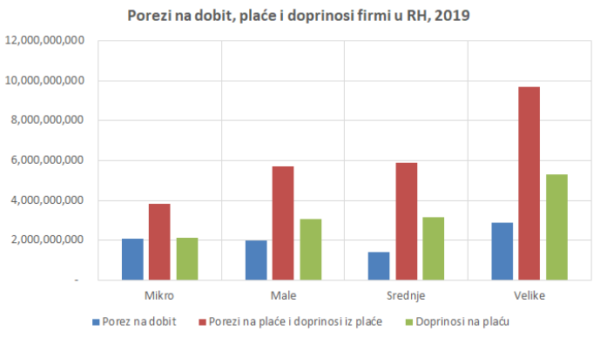
Vuk Vukovic: The government needs to find a way to save these companies
''It should be borne in mind that this is an impact assessment based solely on the latest data available from the end of August. At the end of the year, after the new lockdown, even more Croatian companies are likely to find themselves in troubled waters, which means that many more jobs are potentially yet to be put at risk, and as such, tax revenues and budget contributions will also be in the same boat.
I'd like to note that these calculations don't take into account the lack of VAT revenue from companies that will potentially fail and whose staff would find themselves out of work. Thus, all of the above estimates very likely underestimate the strength of the final effects of all this. I think that the situation is very serious and that the government should find ways to prevent the collapse of so many companies as soon as possible,'' concluded Vuk Vukovic, the founder of the Economic Council of the Glas Poduzetnika Association.
For the latest travel info, bookmark our main travel info article, which is updated daily.
Read the Croatian Travel Update in your language - now available in 24 languages
Small Business Owners Demand Urgent Reforms
ZAGREB, Dec 7, 2020 - The Voice of Entrepreneurs association laid a wreath outside the Ministry of Economy and Sustainable Development on Monday, calling for "urgent and brave" reforms and the replacement of Minister Tomislav Coric.
Cars and buses briefly blocked the traffic in the street in front of the Ministry as protesters lit lanterns and laid wreaths and flowers at the entrance to "pay their last respects" to small and medium-sized businesses hit by the partial lockdown imposed as part of government efforts to curb the spread of the coronavirus pandemic.
They once again appealed to the prime minister to fire "the worst economy minister Croatia has ever had." They drew attention to the "intolerable absence of concrete aid and compensation" for all businesses experiencing a sharp decline in their activity.
The association's head Hrvoje Bujas said that Croatia had lacked key reforms over the last 30 years. "It is high time we organised ourselves to ensure the implementation of key reforms. It is also high time that the reforms become the key topic for every economy minister and for every minister in the Croatian government, including the prime minister," he said.
Bujas said that Croatian small business owners were leaving the country in search of better business conditions abroad. He stressed the need for a better functioning judiciary, optimisation and digitalisation of public and local government, lowering VAT and scrapping various parafiscal charges.
The association's executive director Drazen Orescanin said that they had good dialogue with some of the ministries and state institutions, but not with the Economy Ministry. He complained that Minister Coric was not communicating with them at all.
Orescanin said that the present government should represent all people and not just voters of the Croatian Democratic Union (HDZ) party. If the party cannot find an appropriate person to serve as Economy Minister, there are many competent experts for this post who are not members of any party, he added.
At the end of the protest, two police officers approached Bujas and Orescanin and took down their details as well as the registration numbers of the vehicles that blocked the entrance to the Ministry building.
"We'll see what the police will do. We won't be surprised if we get fined," Orescanin told Hina, adding that this was not a protest rally but a gathering because protest rallies were not allowed in the present time of the pandemic. He noted that about 20 members of the Voice of Entrepreneurs and partner associations were present, which is in line with the epidemiological measures, while the rest were representatives of the media. They all wore face masks and did not violate any measures, he stressed.
Entrepreneurs Want Compensatory Measures to Apply to all Affected Activities
ZAGREB, November 30, 2020 - The government has not found a solution for all businesses that have been strongly affected by the coronacrisis, the Voice of Entrepreneurs (UGP) association said on Monday after a meeting with government officials, adding that compensatory measures need to include all affected activities.
Government representatives met with employers and representatives of the hospitality sector today to present compensatory measures designed to help offset the consequences of the latest lockdown imposed due to the deteriorated epidemiological situation in the country.
UGP underlined that it had much higher expectations from the meeting.
"We welcome some measures that were presented by ministers like the new COVID loans by HAMAG-BICRO. One of the recommendations is to compensate fixed costs but only for those activities that have been shut. We believe that all activities with a large fall in turnover need to be compensated regardless of whether they are formally shut," UPG said in a press release.
Citing the event industry, temporary providers of transport services, travel agencies and other activities that depend on activities that have been shut down, UPG wondered if they would be left to cave in.
One of UPG's proposals is a temporary reduction of VAT for the affected activities. The association believes that VAT should urgently be reduced to 13% in order to boost consumption and that a move like that would facilitate business for all affected activities, including hospitality and other service industries. Almost all EU countries have done just that, the association notes.
UPG president Hrvoje Bujas thinks that short-term measures are insufficient and that there is no plan for long-term reforms.
"We are unhappy. We presented clear and substantiated proposals that are in Croatia's interest, please listen to us," Bujas added.
STOP Unnecessary Charges: 'Voice of Entrepreneurs' Petition Against Parafiscal Levies
October 6, 2020 - Continuing its efforts to protect businesses, the Glas Poduzetnika (Voice of Entrepreneurs) Association turns its attention to parafiscal levies.
Signatures so far: 10.400+
Start date: 30.9.2020.
Full text of the petition:
Voice of entrepreneurs Association (Glas poduzetnika) is organizing the signing of the petition:
STOP unnecessary charges!
With this petition we demand the abolition of the mandatory membership fee in the Croatian Chamber of Commerce (Hrvatska gospodarska komora), the Croatian Chamber of Crafts (Hrvatska obrtnička komora) and the Tourist Boards, as well as the abolition or drastic reduction of all other parafiscal charges that burden entrepreneurs, craftsmen and all other citizens!
Parafiscal levies mean non-tax levies, ie various fees imposed by the state. Although they are called "non-taxable", they have the same economic effects on entrepreneurs, craftsmen and citizens as taxes. In 2019, entrepreneurs, craftsmen and citizens paid over HRK 9 billion for over 500 parafiscal levies.
Among the parafiscal levies are mandatory membership fees that entrepreneurs are forced to pay to the Croatian Chamber of Commerce, the Croatian Chamber of Crafts and the Tourist Board.
We demand that membership in the Croatian Chamber of Commerce and the Croatian Chamber of Crafts becomes voluntarily.
We demand that the payment of membership fees to the Tourist Boards becomes abolished, and that their work starts to be financed from sojourn taxes.
We demand a drastic reduction in all other parafiscal levies.
Glas Poduzetnika's postulate is clear - #LessTaxes!
Sign the petition and take the first step towards Croatia 2.0!
The petition is supported by the following professional associations:
CISEx - Croatian Association of Independent Software Exporters
Lipa - Association of Taxpayers
NUU - National Association of Caterers
Women in Adria - association of women in entrepreneurship
Croatian Family Farm Association "Life"
Association Requests Lower VAT for Hairdressers and Fitness Studios
ZAGREB, July 28, 2020 - The Voice of Entrepreneurs association (UGP) on Tuesday called for lowering of the standard 25% Value Added Tax rate to 13% on services provided by hairdressers and fitness studios, explaining that this would be benefit the state budget in the long run and would also create more jobs.
The association presented the findings of an analysis showing that a lower VAT on those services would have multiple positive effects on employment and doing business.
The UGP said that hairdressing is one of the few occupations that have survived changes introduced by the Internet.
The association says that hair salons are mostly small businesses that have managed to remain on the market, but there are fewer and fewer of them and therefore it is necessary to address the issues bothering them in a serious manner.
The lower VAT, the less grey economy
The UGP said that a lower VAT for hairdressers and fitness studios would help reduce the grey economy.
By reducing the VAT rate, the authorities would encourage doing business legally, and consequently, there would be more revenues in the state budget, it added.
GP Pulse 93: Croatian Entrepreneurs – Readiness to Change and New Ways of Doing Business
July 25, 2020 - What is the awareness of the new functioning of the market and the willingness for necessary changes?
One of the long-term goals of UGP is the development of entrepreneurial, proactive, and creative culture and mindset. We have identified the various training needs of our members, and with the development of the Association, this will undoubtedly become one of the most significant advantages. Given that we are facing a large-scale crisis in a global context, aside from focusing on short-term measures for the survival of companies, we wanted to turn to the changes that will be required in the medium or long term. Considering the unpredictability of the time ahead, it is necessary to strengthen the capabilities of entrepreneurs and their firms in several ways – through new knowledge, attitudes, relationships, values, and interests. To get as much information as possible about the entrepreneur's current activities related to the upcoming period, we asked them, "What are entrepreneurs doing with their business to prepare/adapt to the new circumstances?"
The most significant number of our members, 46% responded that they are optimizing current business processes and human resources, which is very logical and necessary. About 20% said they are developing new methods or remodeling old ones, while 3% is changing the customer pool, which is a slightly higher level of innovation, but the question remains, will this be enough? 11% of responders say they are changing the entire structure of the firm to adapt, and here we can add some just above 5% of those who say they are completely changing both the market and services and are turning to new deals. Relatively small, but not negligible 8% take the financial support and wait for the situation to normalize, and about 5% plan to close the company and transfer their business to another country.

These results leave room for moderate concern. Even though more than 60% of firms are making some changes, only 16% of them are considering the sharp turns that would be required in the worst-case scenario. Of course, it seems that this threatens to disappear more than 13% of firms that passively wait for the situation to develop and hope or leave the country.
Given this situation, it was also logical to check what entrepreneurs thought might lead to their launch and help them start looking for new business models and faster changes that would be required. We got polarizing but very interesting answers to this question: more than 57% understand that measures are not a long-term solution and that they should be canceled relatively quickly (in a matter of months) because people avoid changes until they are forced to. The second answer is given by 23% of respondents who think the opposite – that it is necessary to extend existing measures as long as possible to get time for the required transformation. We believe this is a good indicator of how awareness is growing. It's becoming clear that dependence on government subsidies can't last and that entrepreneurs will have to be even more entrepreneurial.

Finally, we asked our members, "How much time and energy have you invested in developing new ideas and ways of doing business over the past few months?"
About 55% said that they are actively working on new business opportunities and that this is their primary focus, which we think is the right answer. Just above 26% admitted that they did very little to deal with it and mostly focused on crisis and survival. A moderate 14% have adapted somewhat, but plan to continue working on it, and again 3% say their option is to go to another country.
At a time when the necessary reforms are expected to be implemented by the new Government, and in a situation that has already caused the departure of some foreign firms (the latest case is Meggle), it is clear that the fight for the economy and maintaining the quality of life will be tough and will require complete solutions. As a country, we must become more competitive, the four postulates of UGP must be implemented to facilitate business, reduce bureaucracy and administration, ensure that justice is better and faster met, and control all costs well while avoiding clientelism. On the other hand, this will also not be enough if entrepreneurs themselves do not take huge steps and change the strategies and ways of doing business, and some of the industries in which they work. Because of this, UGP supports the lifelong education and progress of the entrepreneurs, which it will also actively work on, hoping to create a positive entrepreneurial climate in the country as soon as possible. If that does not happen, and from these figures, you can calculate black scenarios and a drop in GDP, which will be estimated in tens of percentage points.
***
The GLAS PODUZETNIKA Initiative started as a citizens' self-organized group, most of which are small entrepreneurs, after the announcement of the first set of Government's measures, which the organizers deemed insufficient. The Initiative assembled more than 100,000 entrepreneurs, small business owners, self-employed, and the employees in the private sector in less than 15 days, drawing the media spotlight with its uncompromising requests and appearances. Considering this, GLAS PODUZETNIKA positioned itself as a relevant factor in public discussions aimed to determine Croatia's new economic direction. Its position was also confirmed by the Government of the Republic of Croatia, which has included some of the Initiative's suggestions in the second set of economic measures, thus confirming Initiative's undeniable influence. At the request of the Initiative's members, the GLAS PODUZETNIKA Association was established, gathering more than 12,000 members. More than 200,000 Croatian citizens support the Association.
For the latest on the Glas Poduzetnika initiative, follow the dedicated TCN section.
Entrepreneurs Do Not Trust Croatian Justice System
June 30 - UGP conducted several surveys among its members on the topic of the justice system. The results are devastating, but unfortunately, expected. The slow and inefficient judicial system is also, according to entrepreneurs, one of the main problems of Croatian society. The UGP believes that legal reform should be one of the first reforms of the new Government.
One of the UGP's postulates is #morejustice, and one of the reforms we requested from the Croatian Government applies to the Croatian justice system. Even though the trust in the justice system is generally on a low level, it seems like it is also a more significant stumbling block for entrepreneurs and a barrier in the business.
For this reason, we asked entrepreneurs more questions to process the topic better and try to find out where all the reasons for such deep dissatisfaction lie.
The first question was, "What is the role of the judicial system in the exercise of entrepreneurs' rights?" Only 0.5% of respondents think that the system helps significantly, as it should. The same number of respondents think exactly the opposite: the justice system substantially makes things worse, 0.5%. Very few, 1.4% think that the justice system moderately helps, making the overall positive perception under 2%. 17.7% think that the justice system does not help entrepreneurs. The largest category, 80% of respondents say, "Come on, please..." which suggests that the condition is so bad that there is no point in answering the question on any positive impact. This level of resignation is the first sign to raise the alarm.

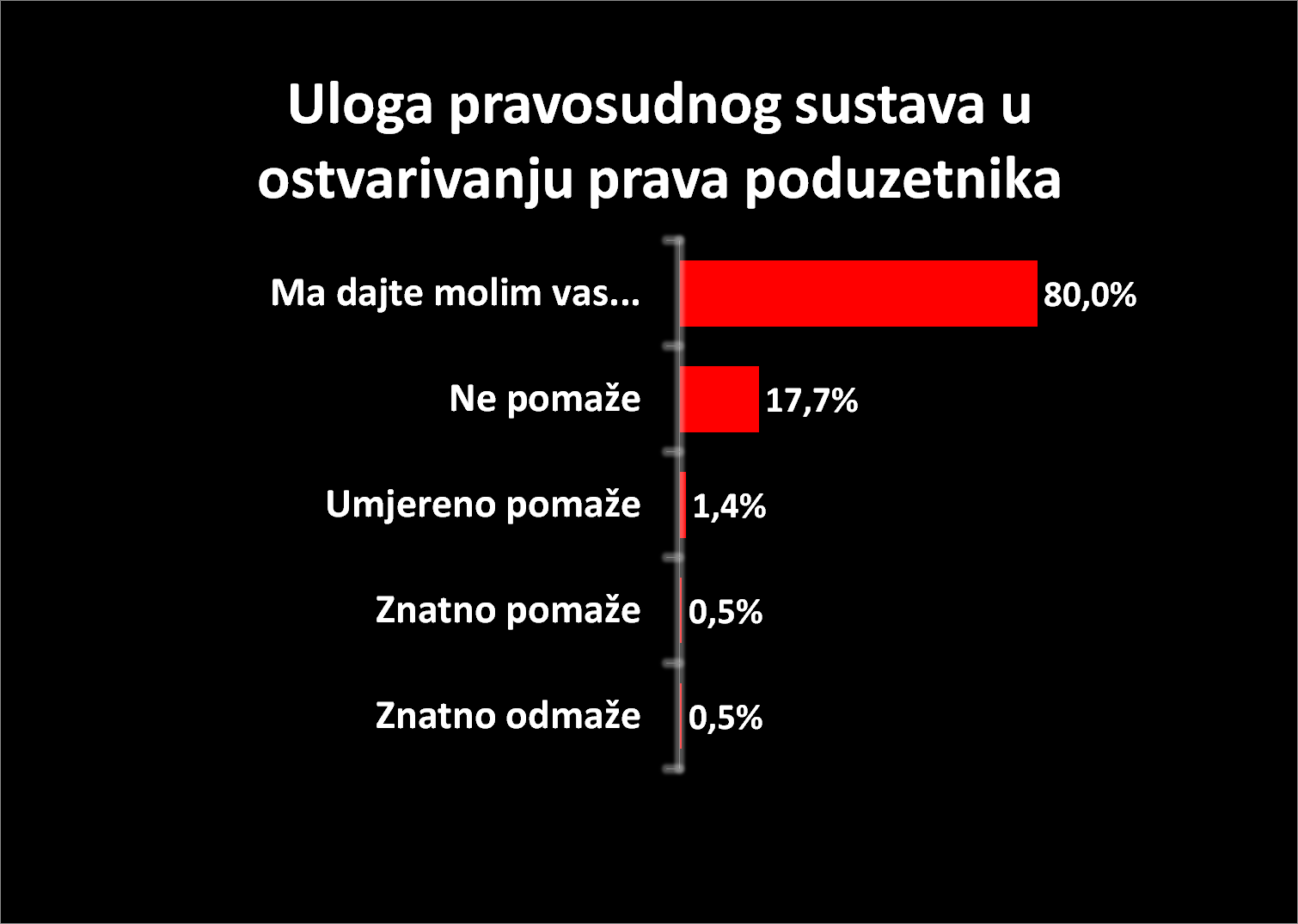
The second question was about the length of litigations, given that both the viability of the business and the survival of the firm can often depend on it. We received responses about the duration of legal proceedings that our members conducted or are conducting: only 2.2% say the proceedings lasted under two years, which we consider a reasonable deadline. Another 5.9% said that the procedures lasted for a somewhat acceptable 2 to 5 years. The most significant number of votes — 47.8% — went to the answer "more than five years." This time range doesn't make much sense in the business context. Up to 33% say that the procedures lasted more than ten years, which is entirely unacceptable.
The latest information is that almost 11% say they had or still have proceedings going on for more than 20 years! We don't even know how to comment on this last part.
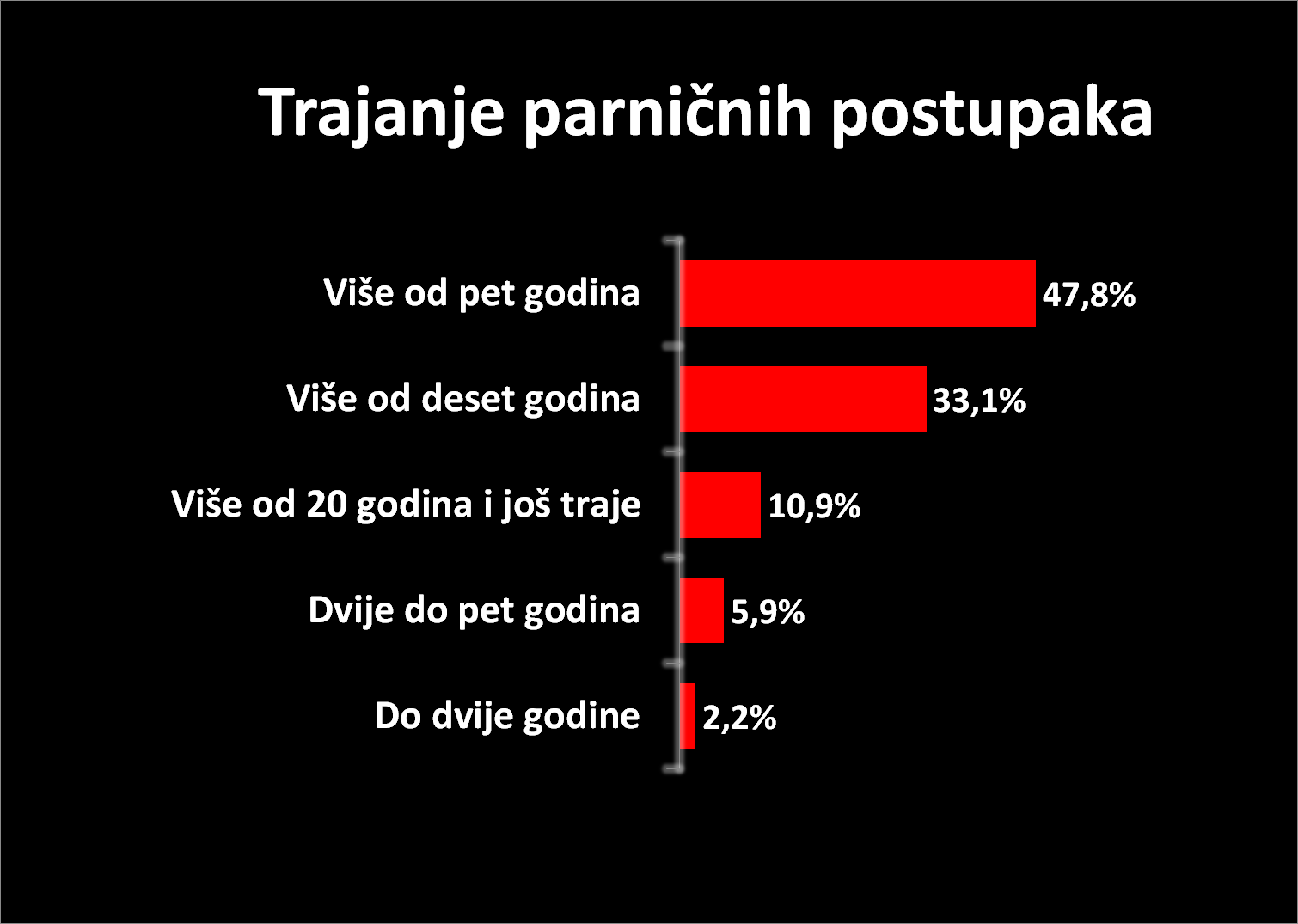
Part of the reason for the great disappointment in the justice system is probably due to the difference between expectations and the reality of the speed and effectiveness of the system. Answers to the question, "How long, in your opinion, can a court proceeding last?" For a reasonable timeline — up to 18 months, voted about 18% of respondents, while only about 1% of respondents agree that a reasonable time frame is over 18 months. The remaining approx. 80% think that the court proceedings should last less than 18 months — of which the most significant number, 54% of them, feel that they should last up to 6 months. Others suggest even shorter deadlines of no more than three months or only a month. From this data, we can see that there is almost no overlap between the periods that entrepreneurs consider necessary and what is happening in reality. There are only 2.2% of processes that last less than two years.
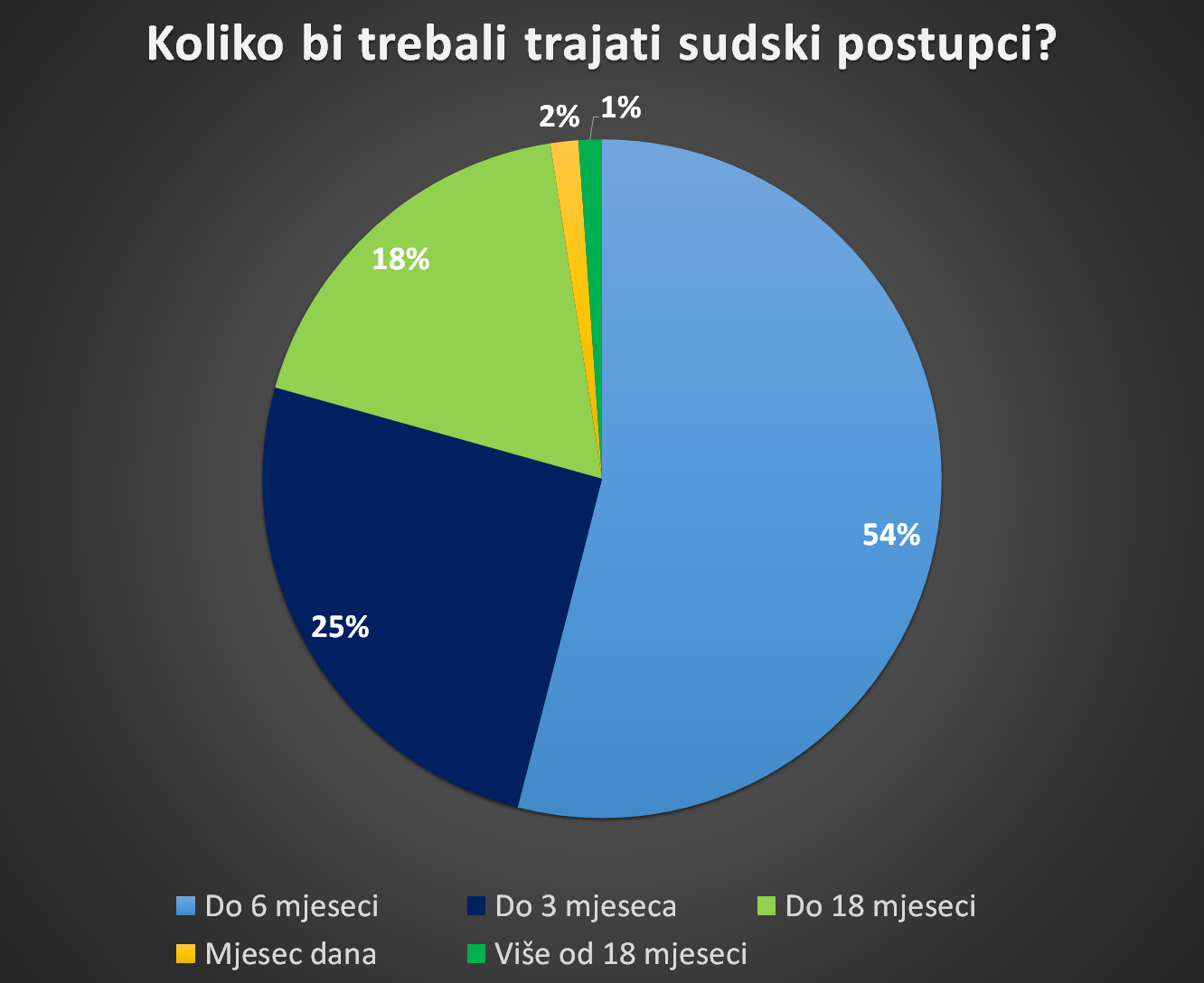
With the question, "What is the Croatian justice system's biggest problem?" we checked why the results are so bad. We got the following answers: Just under 11% think that the reason is a particular element — corruption. About 9% believe that the reason is general inefficiency, and over 3% believe the reasons are political pressures and the slowness that favors the legal framework. Interestingly, less than 2% of respondents added the lack of funds and ignorance, as the answers. We are left with the answer with the highest percentage of votes, more than 70%, which says that all of the above is the cause of the problem and that it makes no sense to single out something individually. According to previous results, a negligible 0.2% believe that there is no problem.
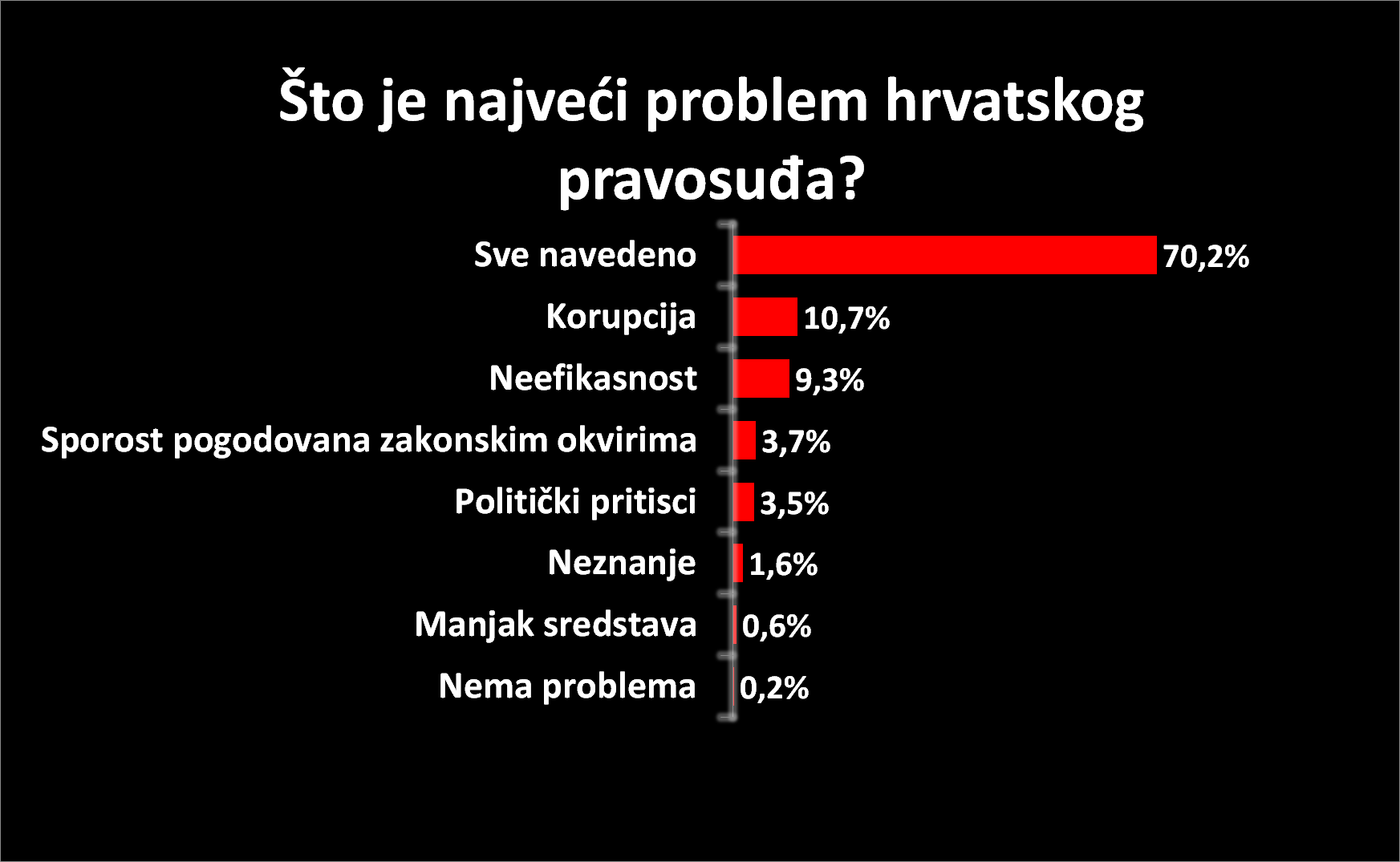
Additional information about a burning issue and what should be addressed first in some reforms, we got with the question, "What should be resolved first in the judicial system?"
Almost 61% of respondents believe that it is corruption. The second answer in size is speed, chosen by about 16% of respondents. About 12% of respondents think that all of the mentioned should be addressed along with many other things.
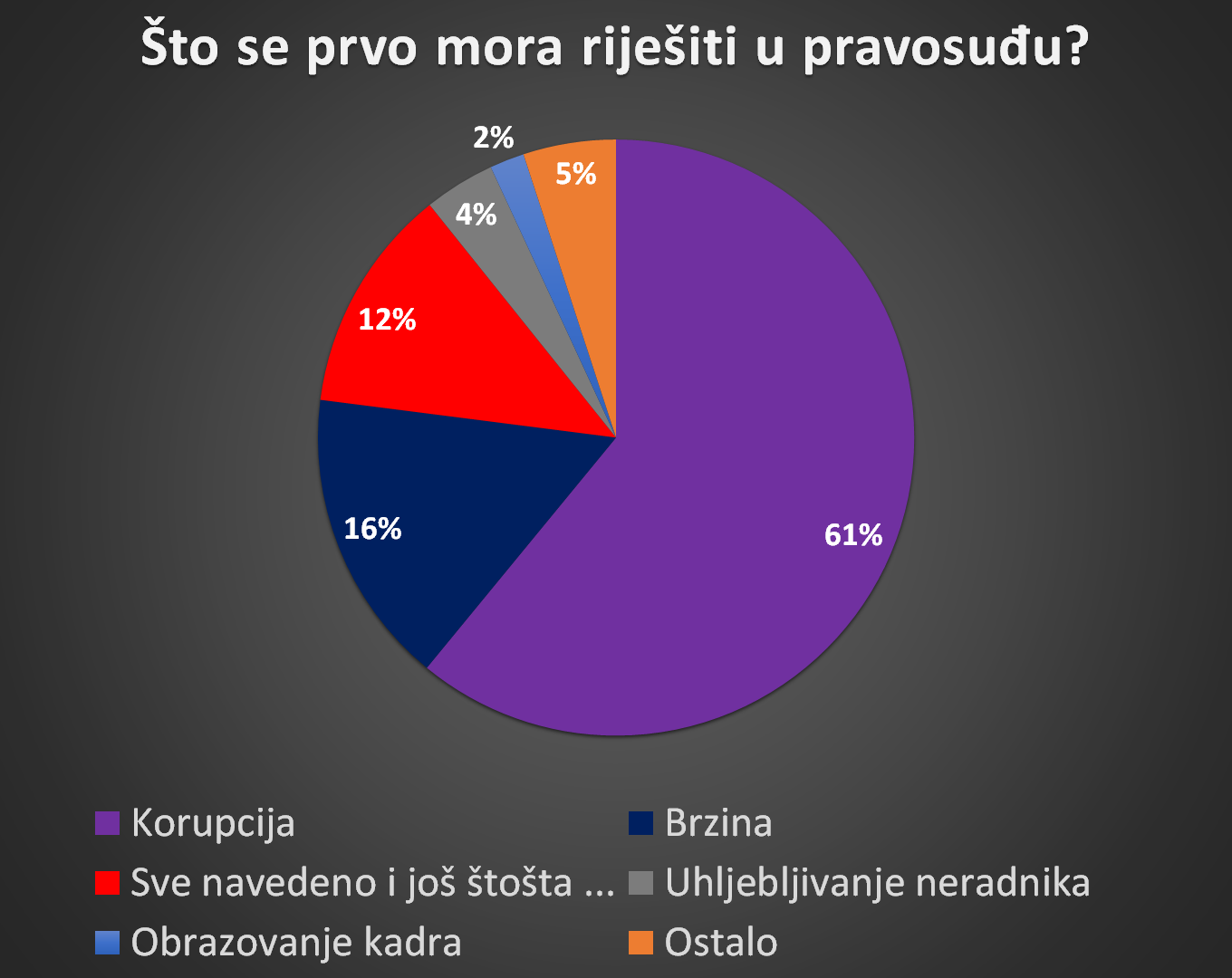
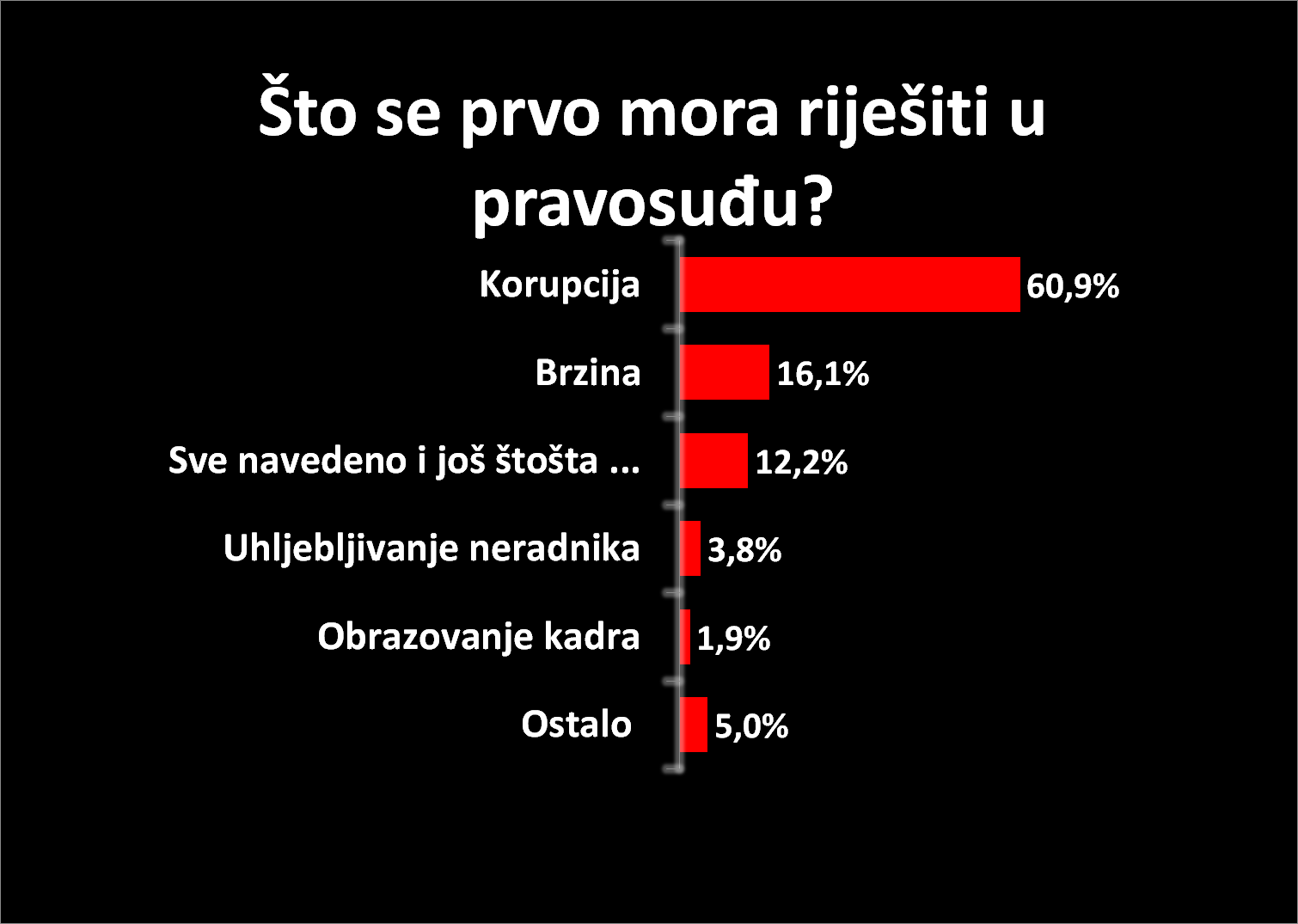
And the last part of the picture of Croatian justice is the perception of whether any changes are taking place. We asked our members if there are any reasons for hope and positivity, "How has the Croatian justice system been in the last few years?" We hoped to find at least the hints of a positive trend. Here are the answers: The most significant number of respondents — almost 58% believe that the condition is nearly as bad, and there are no changes. A great 39.5% believe that even this awful situation is not stable, but rather that things are getting worse and worse. Only 1.3% think that we are making progress, but not enough. And alone again, negligible 0.2% believe that the justice system is getting better and more effective.
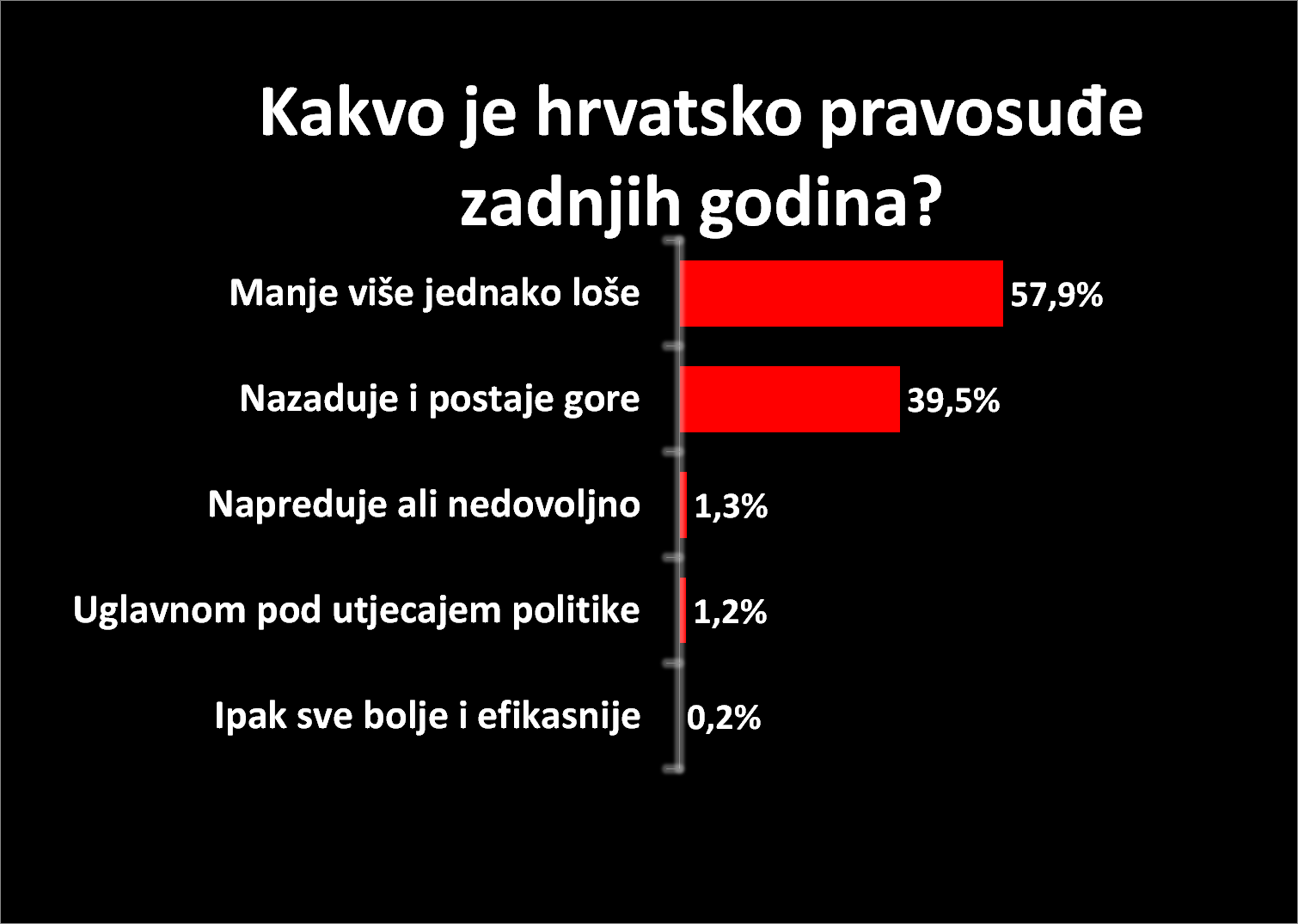
The conclusion is that Croatian entrepreneurs, who barely survive anyway, have very little confidence that the judicial system will help them professionally, objectively, and effectively. Given the speed of activities in the business world, the slowness of the legal system is catastrophic, and fewer people are counting on it. The main problem is corruption, more precisely the perception of corruption in the justice system, and hopelessness because things do not improve, and even go backward from year to year. The examples we got when doing surveys are numerous, and many of them sound unbelievable. For all these reasons, it is clear how the Glas poduzetnika Association will advocate for significant reforms and changes in the judicial system's work. Without it, as an integral part of the reforms that we demand, it will not be possible to ensure prosperity in the state because we want to see Croatia 2.0 as soon as possible!
"Justice system as the gangrene of the Croatia society is a phrase that has been used in the public space ever since the foundation of Independent Croatia. It's been used so much that it has lost its force at the same time, but unfortunately not the meaning and truthfulness.
By everything we've been served for many years, it appears that justice reform is an impossible mission, and the goal may not be easily achievable, but it is feasible. Many states we try to look upon achieved it before us. That cannot be done without a clear plan, decisions, and deadlines for their implementation, which would lead us to open the same subjects on some future elections again. UGP will closely monitor the politicians' work and their public actions to influence the judicial system to stop being mentioned in a negative context." said Hrvoje Bujas, president of the Glas Poduzetnika Association.
The Glas Poduzetnika Association: Holidays In Croatia Are Safe!
June 25 - Croatian tourism and hospitality professionals, and entrepreneurs decided to react affirmatively and send out a positive message.
This years' tourist season is the main subject of headlines, but not for good things. Lapses in the organization of the tennis tournament in Zadar, without adhering to the recommended protective measures endangered the little that we had of this season we hoped for after the first news regarding the participants who tested positive came out. Unfortunately, after the news about tennis players who tested positive for coronavirus ravaged all the world's media and caused a very negative reaction to the epidemiological situation in Croatia, there was no timely response from the Ministry of Tourism and Croatian Tourist Board, as well as any form of communication with potential guests from abroad and putting out the media fire. Glas Poduzetnika Association asks for the Government’s full focus and readiness to manage the crisis. We have repeatedly warned that the elections were called at a completely inappropriate time, and this statement becomes more accurate every day.
The Glas Poduzetnika Association gathers many entrepreneurs from the tourism, hospitality, and all accompanying fields and activities. We will do everything in our power to save the tourist season and the existence of our employees. Some EU states, such as Slovenia and Austria, have already announced the possibility of re-closing borders with Croatia. Many of the reservations that tourist workers have been fighting for in recent months were canceled overnight. That has done significant damage to tourism and the economy.
"We make an extraordinary effort in our hospitality establishments and accommodation units for our guests to enjoy a superior holiday experience in Croatia, our food, culture, and the beauty of nature. Our employees and we do our best to offer our guests the highest quality service and safety, respecting all measures of disinfection, distancing, and using the prescribed protective equipment. Croatia must be open, but it must also be safe, and we take care of that every day." said Gordana Fabijanić, owner of the famous tavern "Didova Kuća" on the island of Pag, one of the recommended restaurants in the renowned Gault & Millau guidebook for many years. Gordana is also a member of the UGP's Hospitality and Tourism Committee.
More than 200,000 tourists have had the opportunity to make sure of the superior professionalism of Croatian tourist and hospitality professionals on Adriatic in the past days. Due to all of that, our members, tourism and hospitality professionals, decided to send a message to local and foreign tourists: "Croatia is safe, we are professionals, and we adhere to the given recommendations!"
"We want to send a message to all the media in the world, and Croatia, that Croatian tourism workers and hospitality professionals adhere to the recommendations and regulations related to preventing the spread of the coronavirus disease. We invite all tourists to come to Croatia and EU States not to close borders with Croatia. We are serious and professional." stressed Vedran Jakominić. member of the UGP's Hospitality and Tourism Committee.
We in the Glas Poduzetnika Association and our members are still optimistic. We believe that #CroatiaCan save the season, preserve the health of its citizens and guests, provide hospitality for all and go ahead! Holidays in Croatia are safe because hospitality and tourism professionals are responsible, and we wish for all the world to know that with the slogan #CroatiaIsSafe.
Hardworking entrepreneurs and workers cannot do this alone. The intentions during the organization of the tournament in Zadar were good, and the goal was the promotion of Croatia in a positive light. Still, unfortunately, lapses were made, and the media effect was just the opposite. Blaming the organizers and the Civil Protection Committee will not lead us to anything or repair the damage. Mistakes happen, and we learn from them, we must look forward and make sure not to make similar mistakes in the future. We have to be open and minimize the risk. We hope that the Government and the Civil Protection Committee will learn something from this, that they will be more critical to their work and mistakes, and that they will sincerely apologize to the entrepreneurs for the damage they unintentionally caused with this situation. We believe that they will behave more responsibly in the future and be up to the task and help the tourism and economy.
***
The GLAS PODUZETNIKA Initiative started as a citizens' self-organized group, most of which are small entrepreneurs, after the announcement of the first set of Government's measures, which the organizers deemed insufficient. The Initiative assembled more than 100,000 entrepreneurs, small business owners, self-employed, and the employees in the private sector in less than 15 days, drawing the media spotlight with its uncompromising requests and appearances. Considering this, GLAS PODUZETNIKA positioned itself as a relevant factor in public discussions aimed to determine Croatia's new economic direction. Its position was also confirmed by the Government of the Republic of Croatia, has included some of the Initiative's suggestions in the second set of economic measures, thus confirming Initiative's undeniable influence. At the request of the Initiative's members, the GLAS PODUZETNIKA Association was established gathering more than 12,000 members. More than 200,000 Croatian citizens support the Association.
For the latest on the Glas Poduzetnika initiative, follow the dedicated TCN section.
GP Pulse: Elections 2020 – Entrepreneurial Spring
June 17, 2020 - Will entrepreneurs finally have a decisive influence on the election results?
It is only a few weeks until the new parliamentary elections. UGP's attitude was clear. We thought that, just like most entrepreneurs, elections were scheduled too early. Political structures were focused on them, not at solving one of the world's largest health and economic crisis. We are afraid that politicians again looked only at their interests and calculated what's most cost-effective for them, instead of demonstrating state potential and solving general social importance issues, for which they received a mandate and for which they are paid.
We have already written about who entrepreneurs are (especially small, micro, and medium-sized ones), and we were also interested in what actions motivated them.
Given the massive influence through the media, both among the general population and among entrepreneurs, who significantly homogenized, we investigated their attitude to politics and elections through several surveys. Many of the data (as we will see) indicate that entrepreneurs (especially micro, small and medium-sized, and self-employed and small business owners, most of whom are in UGP) are awaking as a group. They are becoming more aware of their untapped potential, which is starting to focalize for the overall well-being of society.
First, it would be nice to note the perception of under what conditions, or better, in what "climate" do Croatian entrepreneurs work? To the question – What is the extent of (anti-)entrepreneurial climate in Croatia? We got these answers: almost 90% believe that the climate in Croatia is anti-entrepreneurial and that entrepreneurs are being harassed and discouraged. This number is supported by nearly 8% who think that the climate is somewhat anti-entrepreneurial and makes it difficult for entrepreneurs to work. It is worth noting that no one believed that the climate in Croatia is good for entrepreneurs.


Given this situation, a logical question arises: What do entrepreneurs plan to do to change this? Of course, there are many options, one of which is registering with UGP, which many have used. We were interested in direct action in the upcoming elections, so we asked them: Will you give preferential votes to listed entrepreneurs in the forthcoming elections? The answers were pretty clear: 84% said they would vote for entrepreneurs who are on the lists. Only 7% said that it did not matter to them, and highly interestingly, only 2.6% said that they would not go to the polls.
This information is exciting because there were only a few entrepreneurs in the last convocation of the Parliament, and that there is a need to improve the representation of business interests. Also, such information can lead to a preponderance both in the formation of the lists of individual parties and coalitions, if they want to maximize the votes of their voters.
This motivation was additionally confirmed with the question: For whom, in your opinion, is it essential to be in the new convocation of the Parliament? More than 41% of entrepreneurs said they believe that an entrepreneur should be in Parliament, while options such as doctors, academics, or musicians did not get too many votes. Almost 40% of people said that specialists should be in Parliament and another 13% only that it would be enough if they were righteous, no matter who they are.

Of course, desires are one thing, and what someone is willing to do another. The relationship between attitude and behavior is not always as simple as one would think. So far, there are also very few entrepreneurs who actively participated in politics and took higher positions. Given the desire for better representation and willingness to vote for entrepreneurs, we asked them – Are you ready to appear on the electoral lists of any party? More than 46% gave the expected answer – No, not getting close to politics. There is 37% of those who understand and appreciate the effort of those who went on this adventure saying: I am not, but I support those who dare to enter the political arena. And very interestingly, I believe more than ever – up to 13% of respondents said that they are considering this option or that they would be politically activated if they find the right choice.


According to information that UGP has, there has already been a shift in the number of active entrepreneurs that will be found on the lists of parties across the political spectrum. Opportunities are being created, and the potential for change and the goal defined by UGP as Croatia 2.0 is growing. We asked our members for even better results: What else would motivate you to go to the polls? The responses correspond to information from previous surveys. More than 33% say that they go to the polls regularly, and another 30% say that this time they are participating for sure, even if that wasn't the case before. About 25% report that they are motivated by the party's support for UGP requirements. As a reminder, UGP Pledge was sent to all major parties, having received the answers and support from almost all of them except HDZ (no response) and SDP (they agree only with some requirements). Another 5% say that they would like to see more entrepreneurs on the electoral lists and that, in this way, different parties can motivate them.

Of course, even though UGP has repeatedly stated that it does not want to enter politics or engage as a party, it follows both the campaign promises and the statements of all active stakeholders. In election time, as they have every time so far, the parties have flippantly started pouncing on various figures and plans, such as the number of new jobs, or an increase in the minimum wage. That only showed that they are not interested, nor do they understand the economic context, but rather are trying to collect the cheapest political points. How many of them can be obtained from entrepreneurs, we checked with these questions: Do you think that the current governing coalition has fulfilled all its (old) campaign promises? The answers are clear, more than 90% believe they didn't fulfill anything, and only 5% favorably say they completed as much as they could. More than 2% hold that someone who dares to make such statements should be immediately disqualified from further discussion.

Entrepreneurial memory goes back four years and shows evident dissatisfaction with the current leadership of the state. But we also wanted to see how much they trust the new promises of the currently opposed parties, which are not far behind the well-known rhetoric. We asked another question: How much do you think the Restart coalition (SDP and others) will fulfill their campaign promises? The answers are similar, as in the previous question: almost 75% say that those are all empty stories. Another 16% have a good memory and says that they had their opportunity and haven't used it. And only 4% think they can make a difference.

And with that, the circle is closed. More than 90% of entrepreneurs do not believe in either the governing or the opposition party. On the other hand, so far, they have been quite active in voting. With the pressure from a crisis and struggle for survival, they are even more motivated, including those who have remained passive until now, who will go to the polls this time. The motive, in addition to the short-term catastrophic situation, is the medium-term goal of changing the unbearable anti-entrepreneurial climate in the country, through changes requested by UGP directly and through its postulates. It's time for more entrepreneurs to enter Parliament so their voice can be heard louder. The drive for more entrepreneurs follows a growing number of those who are willing to run, as well as creating a new level of awareness in the private sector that will increasingly value the entrepreneurs who enter politics and leave aside projects and firms to which they often have dedicated their entire lives. In this election, everyone will have an extra compass in mind with UGP Pledge and responses from all parties to our very logical and clear requirements that are needed to make changes for Croatia 2.0. If we want to escape from the rear end of Europe, the awakening of entrepreneurs, their connection, and collective political actions can and must be more powerful and decisive with each new election. After the parliamentary elections, where it will soon be seen who really supported the UGP requirements and who did so only on paper, come the equally important, if not, even more, local elections. There will be opportunities to reward and punish according to the merits promptly. In each case, one thing is clear: through the activities of the Glas Poduzetnika Association, entrepreneurs and their employees come together and concretize their views... The Force awakens.


